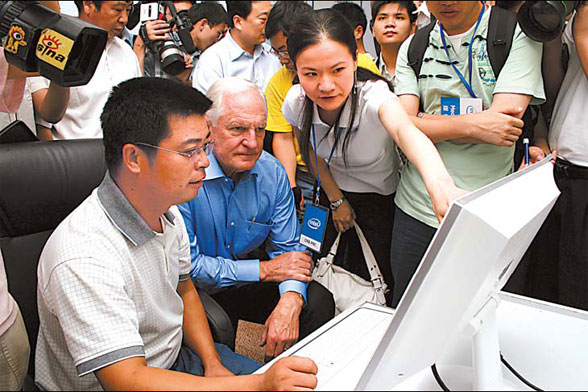Intel eyes China's rural market
Updated: 2008-02-18 15:16
 |
|
A rural businessman (left) from Yanling county, Central China's Henan Province, shows Intel Board Chairman Craig Barrett (center) how he makes online deals. Intel, the world's leading chipmaker, is eyeing China's potential but untapped rural areas. [China Daily] |
Craig Barrett, Intel's chairman of the board, has 740 million people on his mind: China's rural population. More specifically, he's trying to figure out how to get more computers in their hands.
Feeling the sting of rival Advanced Micro Devices (AMD) in China, Intel, the world's leading chipmaker, is now eyeing potential but untapped rural areas so the new hunting ground doesn't slip through its fingers.
Intel has been hatching a seemingly costly but wise strategy: Offering free computers and training before engaging in marketing and sales.
In early September 2007, during his 13th official China visit, Barrett announced Intel would be working with Chinese PC maker Haier to offer user-friendly and affordable computers embedded with Intel chips tailored for China's rural residents.
The two sides officially signed a partnership agreement last November. They will jointly work on the three-year computer strategy to develop rural areas, and Hennan Province in Central China is the first destination where they expect to sell 1 million units. Intel will join Haier in expanding and operating a commercial network for the computer.
"There are about 1 billion users of the Internet today. Most of them are either in established markets or developed areas of emerging markets. I think the next 1 billion users of the Internet will come from the rural market of emerging economies," Barrett says.
The announcement comes a year after Intel signed a memorandum of understanding (MOU) with the Ministry of Information Industry to promote the informatization of the Chinese countryside.
Under the MOU, Intel promises to donate some thousand PCs to selected rural communities and train 30,000 IT professionals in rural areas by 2008. It will also provide 10,000 PCs for free to some rural schools by 2008 and training to over 100,000 rural teachers by 2011.
The company also says it will pour in $30 million to implement these programs.
Balancing act
Is Intel spending huge merely for the purpose of being a responsible foreign investor in China, without any commercial considerations? The answer is no.
"It's always a combination (of charity and business strategy). To a degree, it's giving something back to the community. To another degree, it's also about where another 1 billion Internet users are from. It's a balance between these," Barrett says.
There is a big hurdle that Intel has to overcome before it can begin developing its business in China's rural markets - how to make rural residents believe a PC can really make a difference in their lives.
Intel believes the best solution is providing them with a free try so they can explore the benefits of a PC.
The company's efforts have already begun to bear fruit.
During his half-week China visit, Barrett spent a day in Yao Village in eastern part of Xuchang city, 88 kilometers South of Zhengzhou, capital of Henan, and one of the Intel program's target areas.
The village is famous throughout Xuchang city because almost all of its arable land has been used for planting flowers and greenery, which provides the villagers with a living.
Before the Intel program kicked off, few of the 400 families in the village owned a PC, let alone knew how to use one. They usually took buses and trains for hours to neighboring cities or other provinces to sell flowers and plants, but sometimes came back empty-handed.
All that changed in July 2006 when Intel placed about 10 PCs around the village and local authorities from Xuchang appointed experts to conduct online teaching programs for the rural residents.
"They have done a fabulous job," says Yao Chunmin, a flower planter in the village. "The Internet makes it much easier and cheaper and more efficient to get information on both how to foster qualitative plants and how to find the best buyers."
Yao is now getting used to doing business over the Internet. Yao's monthly net profit has climbed to 6,000 yuan, three times of that before 2006.
There are many other villagers who now agree with Yao that, "a PC is a valuable tool that creates a better life".
|
||
|
|

